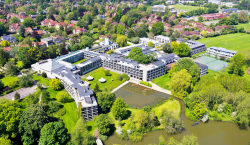We're leading the development of Harper Adams University's decarbonisation strategy!
15 March 2022
We're excited to be leading another decarbonisation strategy for a university estate, this time at Harper Adams University.
Harper Adams University, the UK's leading specialist university for the agri-food and rural business sectors, has commissioned us to lead the development of their decarbonisation strategy project and build on the work started under the University’s award-winning STEP project, which uses a series of renewable resources to help meet campus energy needs.
In response to the climate and biodiversity emergency, Harper Adams University is seeking to develop a decarbonisation strategy which will allow its campus buildings and vehicle fleet to be operationally net zero carbon by 2030. With the NFU – one of the industry partners in our School of Sustainable Food and Farming– setting an ambition of net zero greenhouse gas (GHG) emissions across the whole of agriculture in England and Wales by 2040, the time is certainly right for a project such as this at Harper Adams.” - Adam van Winsum, Environmental and Sustainability Manager at Harper Adams University

In collaboration with Passivhaus designers Collective Energy and cost consultants Currie and Brown, we are developing a strategy with the University that will focus on:
- Making the existing campus buildings and halls of residences more energy efficient, lower carbon and more comfortable through the retrofit of insulation and energy efficient systems
- Defining the energy performance standard for new campus buildings
- Developing a strategy to electrify the campus heating systems and reduce the use of the fossil gas across the campus
- Identifying additional renewable energy and energy storage systems to meet a larger proportion of the university’s energy needs
- Provision of EV charging infrastructure for the university’s estate fleet
The decarbonisation strategy will work with the specifics of the existing estate and be mindful of the University’s rural specialisms. Information produced as a result of the strategy will be used in research and teaching, both in terms of lessons learnt and access to data. We're currently completing an review of the campus buildings, the energy centre, the new heat network and land resources.
An initial programme of stakeholder engagement has commenced, and meetings with the senior leadership team and the university’s 494-hectare farm have already taken place. A further consultation with staff and students is planned for later this month.

.jpg)